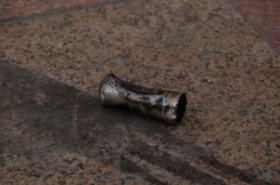 CAIRO: Once again, the use of tear gas on Egyptian protesters is becoming a growing concern. Journalists, activists and others have reported sore throats and chest pain after exposure to only one day of braving the near endless barrage of the nerve agent on demonstrators in downtown Cairo.
CAIRO: Once again, the use of tear gas on Egyptian protesters is becoming a growing concern. Journalists, activists and others have reported sore throats and chest pain after exposure to only one day of braving the near endless barrage of the nerve agent on demonstrators in downtown Cairo.
According to a military source, speaking to Bikyamasr.com on condition of anonymity, “the gas being used has not expired, which make it more potent, but at the same time it dissipates quicker.”
Either way, on the micro-blogging site Twitter, a large number of people who were at or near the frontlines and inhaled the gas, have reported symptoms quicker than in previous demonstrations, which may be a result of the canisters not having expired, as last year on Mohamed Mahmoud street, the focal point of clashes, much of the tear gas fired on protesters had been expired for as many as five years.
Bikyamasr.com research into the canisters witnessed on Qasr el-Aini street has found them to be from the United States, Russia, China and possibly the United Kingdom. More research and expert analysis is needed to confirm this.
According to the Journal of the Royal Society of Medicine, exposure to a single attack can have lasting effects of up to 8 months or longer.
In the study, a group of individuals had been attacked by police tear gas – CS Gas to be exact – and the researchers investigated the short-term and long-term effects of the gas on their bodies. The results are staggering. At least five of the individuals with direct exposure had symptoms one-year on from the attack. They reported coughing fits, a lessening ability to excercise, respiratory problems and asthma.
“1 individual from the direct contact group reported ocular ulcers,” the report said. “‘Other’ symptoms included intermittent paraesthesiae in the arms (1, direct contact) and aching joints and hip pains (2, indirect contact).”
Already, Egyptians have reported the above hand shaking, increased asthma, intestinal problems, chest pains and other symptoms that are likely a direct result of high exposure to the substance.
As far back as 1969, the British Home Office reported that “whilst exposure to CS spray can be lethal in the form of toxic pulmonary damage, leading to pulmonary oedema, such an occurrence would only occur at concentrations that were several hundred times greater than exposure dosage that produces intolerable symptoms which would force the individual to leave the vicinity.”
In Egypt last year and earlier this year, hundreds of individuals have been exposed to massive doses nearly around the clock. They have reported to Bikyamasr.com that they are constantly coughing and had had symptoms known to be the result of tear gas for weeks after exposure.
One Bikyamasr.com staffer reported weeks after February’s clashes of finding his entire body itchy and after talking with a US doctor, found this to be the result of the gas getting into his nervous system.
One activist told Bikyamasr.com that “my hands continue to shake, even when I am laying in bed and sometimes my eyes go blurry.” That was days after the last exposure.
CS Gas, in 1988, was suspended by the Federal Laboratories Inc in the United States for sale. Ironically, however, the vast majority of CS canisters fired in the first days of the conflict in Egypt were manufactured by Combined Tactical Systems of Jamestown, Pennsylvania in the United States.
Egypt may very well be a place ideal for a case study for future research on tear gas and its effects on populations.
1988 the Federal Laboratories Inc in the USA suspended sale of the agent. It is also banned for military use under numerous conventions on weapons, including the 1993 Paris Convention.
Other research, conducted by the US military previously, said CS Gas causes heart and liver damage over a lengthy period as well as resulting in miscarriages and infertility. The US military has banned its use, but the Pennsylvania company continues to produce the gas for international supply.
The United States State Department has repeatedly attempted downplay its role in the use of American-made tear gas, despite allowing massive shipments to arrive in the country over the past year.
Now, as the tear gas dissipates from the air around downtown Cairo, Egyptians will be forced to face the long-term effects of the gas, which medical sources told Bikyamasr.com “may take a long while to fully understand due to the overall lack of studies on the substances in the past.”
